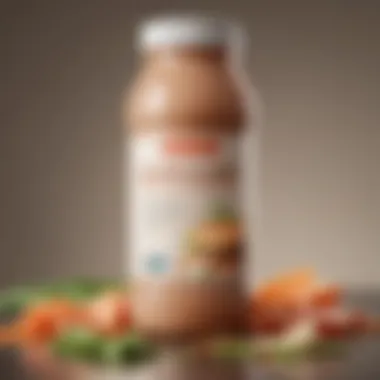Exploring Light Thousand Island Dressing: A Comprehensive Guide


Intro
Light Thousand Island dressing is a popular condiment known for its unique flavor profile. This dressing has a long history and is commonly used in salads, sandwiches, and as a dip. The light version offers a healthier alternative for those who wish to enjoy the taste without excessive calories.
It is appealing to a wide audience who seek to balance enjoyment of food with health considerations. By understanding better its ingredients and variations, you will appreciate the role this dressing plays in modern cuisine.
Its versatility is impressive, making it easy to adapt to various dietary needs.
Recipe Overview
Recipe Name
Light Thousand Island Dressing
Cuisine Type
American
This dressing blends simplicity with a zesty flavor. It retains the essence of traditional Thousand Island while incorporating lighter ingredients. Knowing the base recipe helps in creating variations and tailoring it to meet personal tastes.
Ingredients
List of Ingredients with Measurements
- 1 cup low-fat mayonnaise
- 1/4 cup ketchup
- 2 tablespoons sweet pickle relish
- 1 tablespoon apple cider vinegar
- 1 teaspoon Worcestershire sauce
- 1 teaspoon onion powder
- Salt and pepper to taste
Substitutions for Common Ingredients
- Replace low-fat mayonnaise with Greek yogurt for a tangy option.
- Use low-sugar ketchup to lower sugar content.
- A mix of chopped olives can replace the relish for an alternative flavor.
This combination of ingredients ensures a creamy yet lighter dressing that complements various dishes. Understanding these components allows for easy adjustments according to dietary preferences or nutritional goals.
Understanding Thousand Island Dressing
Thousand Island dressing holds a significant place in culinary history. To comprehend the essence of light Thousand Island dressing, it is beneficial to first understand its traditional counterpart. This dressing is not merely a blend of ingredients; it reflects cultural practices, historical influences, and evolving dietary preferences. Characterizing Thousand Island dressing involves examining its roots, components, and uses across various dishes.
Historical Origins
The history of Thousand Island dressing is somewhat murky, but it is generally believed to have originated in the early 20th century in the Thousand Islands region of New York and Canada. Some sources claim that a variant was created by a fisherman’s wife, while others attribute its invention to a chef at a local resort. Regardless of the exact origin, the dressing gained popularity in American cuisine quite rapidly.
As time went on, the dressing was featured in numerous cookbooks, further entrenching its status. The addition of Thousand Island dressing to the menu suggests an era where culinary experimentation was encouraged, reflecting the American spirit of innovation.
Traditional Ingredients
Traditional Thousand Island dressing typically includes a mix of mayonnaise, ketchup, and finely chopped vegetables such as onions, pickles, and peppers. It often also contains vinegar or lemon juice for added acidity, and spices like Worcestershire sauce and paprika. This combination leads to a creamy, tangy flavor profile that stands out.
However, the ingredient list can vary significantly based on regional preferences and individual tastes. This versatility in ingredients highlights why Thousand Island dressing remains a staple in households and restaurants alike.
Culinary Applications
Thousand Island dressing's primary use is as a salad dressing. Its creamy texture complements greens beautifully. Beyond salads, it has found its way into sandwiches and burgers, where it serves as a flavorful condiment. The dressing also acts as a dip for various appetizers, amplifying flavor profiles with its unique tanginess.
The versatility of this dressing means it can be enjoyed in many forms. Whether used sparingly or as the main component of a dish, it adds a distinctive touch.
Key Point: The evolution of Thousand Island dressing reflects a blend of flavors and cultures, making it a notable element in American culinary history.
Defining Light Thousand Island Dressing
Understanding Light Thousand Island dressing is crucial as it represents a healthier alternative to a classic culinary staple. The love for Thousand Island dressing has long captivated many, but the light version brings in considerations regarding health and nutrition. As individuals become increasingly health-conscious, the demand for lighter dressings grows. This shift is not about compromising taste; it’s about finding a balance between delicious flavors and nutritional value.
What Makes It Light?
Light Thousand Island dressing typically contains fewer calories and fat compared to its traditional counterpart. This reduction can be achieved through several methods:
- Lower fat mayonnaise or yogurt: These substitutes maintain creaminess while cutting calories.
- Reduced sugar: Traditional recipes often include sugar, but light variations might use alternative sweeteners or simply less sugar.
- Increased vegetable content: Adding finely chopped vegetables can enhance flavor and reduce the need for additional fat.


Because of these adjustments, Light Thousand Island dressing remains flavorful while being a better option for those watching their caloric intake. This aspect is what distinguishes it from the heavier traditional recipe.
Key Differences from Traditional Versions
Several critical differences set Light Thousand Island dressing apart from the traditional version:
- Caloric Content: The caloric content of light versions usually drops significantly, making it easier for people to incorporate into a calorie-restricted diet.
- Texture and Consistency: While traditional versions are creamy and thick, light versions often might have a slightly thinner texture due to the reduced fat content.
- Flavor Profile: Some may notice the flavor is a bit less rich or sweet compared with traditional Thousand Island. However, this can be remedied by adjusting the mix of seasonings and adding herbs.
- Ingredient Quality: Many light dressings emphasize using high-quality ingredients like organic vinegars and natural sweeteners, reinforcing their health benefits.
The creativity and care in creating light variations can result in options that are both satisfying and a bit more health-oriented. The importance of defining Light Thousand Island dressing boils down to both its nutritional value and its adaptability for various dietary preferences.
"Light Thousand Island dressing offers a satisfying taste with better nutritional credentials, catering to those who prioritize health without sacrificing flavor."
Ingredients for Light Thousand Island Dressing
Understanding the ingredients for light Thousand Island dressing is crucial in creating a healthier version of this adored condiment. The selection of components not only determines the taste but also directly impacts the nutritional profile. In contrast to traditional dressings, light variants prioritize flavor while reducing caloric content. This balance is essential for maintaining health-conscious culinary practices.
Base Components
The fundamental ingredients in light Thousand Island dressing typically consist of low-fat mayo, yogurt, ketchup, and various seasonings. Low-fat mayonnaise serves as a creamy base while minimizing calories. Greek yogurt adds a unique tanginess without excessive fat. Ketchup, often used for sweetness, needs to be balanced with a reducition in sugar content, contributing to the overall appeal. Other ingredients may include vinegar and spices, bringing in layers of flavor that are essential for this dressing.
- Low-Fat Mayo: Creamy texture, fewer calories.
- Greek Yogurt: Adds tang and creaminess.
- Ketchup: Provides sweetness and color.
- Vinegar: Enhances flavor depth.
- Spices: Personalizes taste, following individual preferences.
Substitutions for Lower Calories
When aiming for a lighter version, considering substitutions can make a significant difference in caloric intake. Often, replacing high-calorie ingredients with lower-calorie alternatives will achieve the desired outcome without sacrificing flavor. For example, you might replace standard mayonnaise or sour cream with avocado or silken tofu. Though these substitutes transform the texture, they provide healthy fats and protein, respectively.
- Avocado instead of Mayo: Creamy, nutritious, and adds healthy fats.
- Silken Tofu: Provides protein and a creamy texture with fewer calories.
- Low-Sugar Ketchup: Reduces unnecessary sugars while preserving sweetness.
Adding Flavor without Calories
Flavor is essential in any dressing, and adding flavor without calories can be achieved through specific ingredients and techniques. Utilizing herbs and spices enhances the overall taste profile without contributing significant calories. Consider employing ingredients like garlic powder, onion powder, or fresh herbs such as dill and chives. Incorporating these elements ensures that the dressing maintains its appeal while being mindful of health.
"Small changes in ingredients can lead to significant impacts on health without losing taste."
Some additional methods to boost flavor include:
- Lemon Juice: Brightens the dressing while adding minimal calories.
- Hot Sauce or Mustard: Introduces a kick without bumping up the caloric content.
This thoughtful approach to creating a light Thousand Island dressing illuminates how conscious ingredient choices can deliver both flavor and health benefits.
Nutritional Aspects of Light Thousand Island Dressing
Understanding the nutritional aspects of light Thousand Island dressing is crucial for anyone conscious about their diet and health. This dressing provides a way to enjoy flavor while managing calorie intake. By analyzing its composition, we can determine its place in a balanced diet and its benefits for various dietary needs.
Caloric Breakdown
Light Thousand Island dressing is formulated to have fewer calories compared to traditional versions. Typically, a standard serving contains about 30-50 calories, while a regular version might hold around 70-100 calories. This reduction is achieved by using lighter ingredients, such as low-fat mayonnaise or Greek yogurt as a base. Additionally, the dressing often includes less sugar and fewer fats, making it a better option for those tracking caloric intake.
To break it down:
- Fat: Generally, light Thousand Island dressing contains about 2-4 grams of fat per serving. This is significantly lower than traditional recipes which can include up to 10 grams.
- Carbohydrates: The carbohydrate content usually ranges from 2 to 5 grams, depending on added sugars or other sweeteners.
- Protein: Protein content is minimal, often around 1 gram per serving. This is comparable to traditional offerings but may have variations based on specific ingredients.
In summary, the caloric breakdown of light Thousand Island dressing caters to health-conscious eaters, allowing them to indulge without compromising their diet.
Health Benefits
Incorporating light Thousand Island dressing into meals can offer several health benefits. First, using lower-calorie ingredients allows individuals to enjoy creamy texture and flavor without consuming excess fats. Furthermore, many light versions incorporate ingredients like Greek yogurt, which boosts protein content. This can be beneficial as it promotes satiety.
Some specific health advantages include:
- Lower calorie intake: Helps maintain or lose weight when used in moderation.
- Reduced fat content: Aids in heart health by minimizing saturated fat consumption.
- Source of flavor: Encourages increased vegetable intake when used as a salad dressing, which is vital for a balanced diet.


"In today's health-focused culinary world, choosing lighter options like Thousand Island dressing can significantly impact dietary habits and overall wellness."
Comparative Analysis with Other Dressings
When comparing light Thousand Island dressing to other popular options, it stands out for its unique combination of flavors, usually blending sweet and tangy elements. For instance, while ranch dressing is rich and creamy, Thousand Island offers a slightly zesty experience. Additionally, vinaigrettes often lack the creaminess that some may prefer.
Here's a brief overview in comparison:
- Ranch Dressing: Higher in calories and fat content, generally offering around 80-120 calories per serving.
- Italian Dressing: Often lower in calories but tends to have higher sodium content, which might not be ideal for everyone.
- Caesar Dressing: Typically rich in calories, often exceeding 100 per serving due to the use of anchovies and Parmesan cheese.
Light Thousand Island dressing provides a middle ground: a creamy, flavorful option that remains lower in calories than many alternatives. By choosing this dressing, individuals can explore a richer taste without the guilt associated with higher-calorie choices.
Making Your Own Light Thousand Island Dressing
Creating your own light Thousand Island dressing is an exercise in culinary creativity and health-conscious eating. Understanding how to make a version suited to your preferences offers many benefits. For one, you can control the ingredients and the calorie count, allowing for a dressing that aligns with your dietary needs. Moreover, home-made dressings can often taste better than store-bought varieties, as they can be tailored to achieve the desired flavor and texture.
Simple Recipes to Try
Here are some easy recipes for crafting light Thousand Island dressing. Each recipe uses fresh ingredients while cutting down on calories.
Classic Light Thousand Island:
- Ingredients:
- Instructions:
- 1/2 cup light mayonnaise
- 1/4 cup ketchup
- 1 tablespoon apple cider vinegar
- 1 teaspoon Worcestershire sauce
- 1 tablespoon finely chopped onion
- Salt and pepper to taste
- In a mixing bowl, combine light mayonnaise and ketchup until smooth.
- Add vinegar and Worcestershire sauce, stirring well.
- Mix in the chopped onion, and season with salt and pepper to taste.
- Refrigerate for at least 30 minutes to allow flavors to meld.
Greek Yogurt Variation:
- Ingredients:
- Instructions:
- 1/2 cup plain Greek yogurt
- 1/4 cup ketchup
- 1 tablespoon lemon juice
- 1 teaspoon Dijon mustard
- 1/4 teaspoon garlic powder
- Salt and pepper to taste
- Stir Greek yogurt and ketchup in a medium bowl until blended.
- Add lemon juice, Dijon mustard, and garlic powder. Mix well.
- Season with salt and pepper, adjusting to your taste.
- Let sit in the refrigerator for flavors to develop.
Customizing for Personal Taste
Customization is key when making light Thousand Island dressing. Each person has unique flavor preferences and dietary considerations. Here are points to consider for personalizing your recipe:
- Herbs and Spices: Fresh herbs such as dill, parsley, or chives can add a fresh dimension. Spices like paprika or cayenne can introduce warmth and heat.
- Sweetness: Adjust the sweetness based on taste. Adding a touch of honey or agave syrup can enhance the flavor profile.
- Texture: For a chunkier version, consider adding diced pickles or finely chopped celery. These will introduce a crunch that offsets the creaminess.
- Dietary Restrictions: For vegan diets, substitute traditional mayonnaise with a plant-based alternative. This alteration retains the dressing’s creamy texture without animal products.
By making your own light Thousand Island dressing, you not only ensure a healthier version of this classic condiment, but also invite creativity into your cooking. Whether it's for salads, sandwiches, or dipping sauces, this dressing remains versatile and flavorful.
Using Light Thousand Island Dressing in Recipes
Incorporating light Thousand Island dressing in various recipes provides both flavor and healthier choices for meals. This dressing is not only a tasty addition but also a versatile ingredient that enhances the complexity of different dishes without adding excessive calories. Understanding how to effectively use light Thousand Island dressing can elevate your culinary creations while aligning with health-conscious eating habits.
As a Salad Dressing
Light Thousand Island dressing shines as a salad dressing. Regular salads can become mundane, but adding this dressing can transform them into exciting, flavorful treats. The tangy-sweet profile complements a variety of greens and vegetables.
Using it can help make salads more appealing to those who wish to increase their vegetable intake. A simple mix of lettuce, cucumbers, and tomatoes drizzled with light Thousand Island dressing can serve as a refreshing side or even a light main course. You have to remember not to drown your salad in dressing. A moderate amount will provide enough flavor without overwhelming the fresh ingredients.
Light Thousand Island dressing can boost the enjoyment of salads, encouraging more frequent consumption of nutritious vegetables.
In Sandwiches and Wraps
Light Thousand Island dressing is perfect for sandwiches and wraps. It adds moisture and flavor without the heaviness of mayonnaise or creamy spreads. This is particularly useful for wraps filled with lean meats, cheese, and colorful vegetables.
When making a sandwich, consider using the dressing to spread on whole-grain bread before adding your fillngs. This not only adds flavor but also creates a wonderful creamy texture that elevates your lunch experience. Experiment with various combinations of meats, veggies, and cheeses to find your perfect sandwich.


Dipping Sauce for Appetizers
Light Thousand Island dressing makes an excellent dipping sauce for appetizers. Whether it’s fresh veggies, chips, or even fried foods, this dressing can serve as a flavorful contrast. It can make healthier snacking more palatable without compromising on taste.
Try serving it alongside a platter of vegetable crudités, or use it as a dip for baked sweet potato fries. The ability to create a healthier dipping option can appeal to a wide audience, especially in social gatherings. Keep a bowl of it within reach to encourage guests to snack healthy.
Cultural Relevance and Popularity
Understanding the cultural relevance and popularity of Thousand Island dressing is crucial for appreciating its role in modern culinary practices. This dressing, with its unique flavor combination, has established itself not just as a condiment but also as a cultural staple. Its significance can be examined through various lenses, particularly within American cuisine and its global adaptations.
Thousand Island Dressing in American Cuisine
Thousand Island dressing holds a cherished spot in American culinary traditions. It is frequently associated with classic American dishes such as salads, hamburgers, and sandwiches. Its creamy texture and sweet-tangy flavor profile make it a favorite choice in many households.
The origins of Thousand Island dressing are often linked to the United States, with several claims to its creation. Regardless of its exact beginnings, the dressing gained popularity in the early 20th century and has since become a quintessential American salad dressing. Its frequent usage reflects a broader trend toward combining flavors to enhance meals. Many diners appreciate it at family gatherings, picnics, and barbecues. Notably, its presence in fast food restaurants has further solidified its popularity, making it accessible to a larger audience.
Additionally, Thousand Island dressing transcends simple usage as a salad condiment. It plays an integral part in the American culinary landscape, appearing in unique dishes like the Reuben sandwich and seafood salads. This versatility enhances its appeal and demonstrates how a single dressing can integrate into so many meals.
Global Variations
While it originates from the United States, Thousand Island dressing has inspired variations around the world. Each culture brings its twist, catering to local tastes and preferences. These adaptations keep the dressing relevant and introduce it to new audiences.
For example, in some countries, chefs may include local spices, fruits, or herbs to modify the original recipe. This results in a dressing that maintains its base flavor while introducing new dimensions. In Japan, for instance, Thousand Island dressing may incorporate elements such as wasabi or rice vinegar, creating a different taste experience.
In certain European cuisines, variations of Thousand Island dressing might be served alongside appetizers, enhancing dishes like fried seafood or grilled vegetables. Its ability to adapt to various culinary contexts highlights not only the flexibility of the dressing but also its international appeal.
"The adaptability of Thousand Island dressing demonstrates how culinary traditions can evolve while retaining their core elements."
This global reach enriches the culinary landscape and showcases the possibilities of adapting recipes across different cultures. As more people discover and experiment with light Thousand Island dressing, its cultural relevance continues to grow, reaffirming its place in kitchens around the world.
Contemporary Trends in Dressing Consumption
In the ever-evolving culinary landscape, dressing consumption has seen a notable shift in trends. This is particularly relevant as consumers become more health-conscious and discerning about their food choices. Light Thousand Island dressing embodies this evolution, providing a flavorful yet healthier alternative to traditional dressings. This section aims to explore the nuances of contemporary dressing consumption, highlighting two key trends that have emerged: the rise of health-conscious options and the impact of dietary preferences.
Rise of Health-Conscious Options
Health-conscious options have surged in popularity among consumers seeking better dietary choices. Many people today are more aware of the importance of balanced nutrition. As a result, they actively look for dressing options that complement their dietary needs without sacrificing flavor. Light Thousand Island dressing stands out as a preferable choice due to its reduced fat and calorie content while still maintaining a pleasing taste profile.
- Lower Caloric Intake: By choosing light dressings, individuals can enjoy their favorite meals with fewer calories, which aids in weight management and health enhancement.
- Natural Ingredients: Consumers increasingly favor dressings that contain natural and organic ingredients. Light Thousand Island dressing can be made with real mayo, yogurt, and various spices, all of which provide satisfaction without unnecessary additives.
These elements underscore why the light dressing market is flourishing. The balance of flavor and health has become a sought-after quality, driving innovation among food brands.
Impact of Dietary Preferences
Another significant trend influencing dressing consumption is the impact of diverse dietary preferences. As dietary habits evolve, more people adopt specific eating patterns, such as vegetarianism, veganism, or gluten-free options. This trend has encouraged manufacturers to adapt their recipes and provide varied dressing choices that meet these dietary preferences.
- Tailored Offerings: Brands are responding to the demand by creating dressings that cater to special diets. For instance, a vegan variant of Thousand Island dressing may eliminate eggs or dairy.
- Flavor Innovation: To attract a wider audience, companies experiment with flavors and ingredients, ensuring that those with dietary restrictions do not miss out on taste.
Importantly, these contemporary trends illustrate how light Thousand Island dressing has secured its place in modern cuisine. Such dressings are no longer mere condiments but integral components of a mindful approach to food consumption.
Epilogue: Embracing Light Thousand Island Dressing
Embracing light Thousand Island dressing offers both culinary and health benefits for diverse palates. This dressing maintains the classic flavors that many cherish while presenting a healthier alternative. The focus on moderation in ingredients can appeal to health-conscious individuals without sacrificing taste. By incorporating light Thousand Island dressing into various dishes, individuals can explore a balance that satisfies their cravings while being mindful of caloric intake.
Summary of Benefits
The benefits of light Thousand Island dressing are notable. They include:
- Reduced Caloric Content: Lower calories make it an appealing choice for those monitoring their diet.
- Versatility: Works well in salads, sandwiches, and as a dipping sauce, making it easy to integrate into meals.
- Healthier Ingredients: Often made with less fat, contributing positively to overall nutrition.
- Cultural Relevance: The dressing's history and adaptability enhance its appeal across different culinary traditions.
By recognizing these benefits, individuals may feel encouraged to make informed choices that align with their dietary goals.
Encouragement to Experiment
Experimentation is crucial when it comes to food and flavor. Light Thousand Island dressing can serve as a gateway to modifying and enhancing classic recipes. Try introducing it to unique dishes such as grilled chicken sandwiches or as a topping for baked potatoes.
One may consider adjusting the flavor profile further by adding ingredients like fresh herbs or spices. This approach could yield a dressing that aligns even more closely with personal taste preferences.
Ultimately, the journey of culinary exploration is about finding new favorites. Incorporating light Thousand Island dressing into one's cooking repertoire may not only lead to healthier options but may also open doors to innovative meal ideas.















